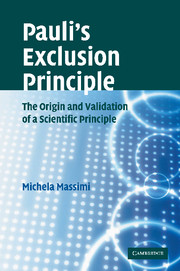Book contents
- Frontmatter
- Contents
- Note on translation
- Preface
- Epigraph
- Introduction
- 1 The exclusion principle: a philosophical overview
- 2 The origins of the exclusion principle: an extremely natural prescriptive rule
- 3 From the old quantum theory to the new quantum theory: reconsidering Kuhn's incommensurability
- 4 How Pauli's rule became the exclusion principle: from Fermi–Dirac statistics to the spin–statistics theorem
- 5 The exclusion principle opens up new avenues: from the eightfold way to quantum chromodynamics
- Conclusion
- References
- Index
Conclusion
Published online by Cambridge University Press: 07 August 2009
- Frontmatter
- Contents
- Note on translation
- Preface
- Epigraph
- Introduction
- 1 The exclusion principle: a philosophical overview
- 2 The origins of the exclusion principle: an extremely natural prescriptive rule
- 3 From the old quantum theory to the new quantum theory: reconsidering Kuhn's incommensurability
- 4 How Pauli's rule became the exclusion principle: from Fermi–Dirac statistics to the spin–statistics theorem
- 5 The exclusion principle opens up new avenues: from the eightfold way to quantum chromodynamics
- Conclusion
- References
- Index
Summary
The aim of this book was to investigate the rationale for Pauli's principle, and the conditions under which we are justified in regarding a phenomenological and contingent rule as an important scientific principle. To this purpose, I urged a Kantian perspective. As a conclusion, I want to foreshadow how this perspective relates to contemporary discussions about images of science, and how it bears upon the on-going debate on scientific realism in philosophy of science. I shall barely scratch the surface of this complex topic and its vast literature. The best I can do in these concluding remarks is to suggest a philosophical position that I think deserves to be further explored. What follows should then be read more as an outline for future research, than as a conclusion.
I began this book by reconstructing the origins of the exclusion principle as a phenomenological rule arising from the spectroscopic research of the 1920s. I argued that the rule was derived – in conjunction with the concept of the electron's Zweideutigkeit – from spectroscopic phenomena with the help of some theoretical assumptions, in the period of revolutionary transition from the old to the new quantum theory. I defended the prospective intelligibility of this revolutionary transition in the light of the piecemeal process of transformation of the old quantum theory, from which brand new scientific concepts and nomic generalizations followed.
- Type
- Chapter
- Information
- Pauli's Exclusion PrincipleThe Origin and Validation of a Scientific Principle, pp. 184 - 188Publisher: Cambridge University PressPrint publication year: 2005



